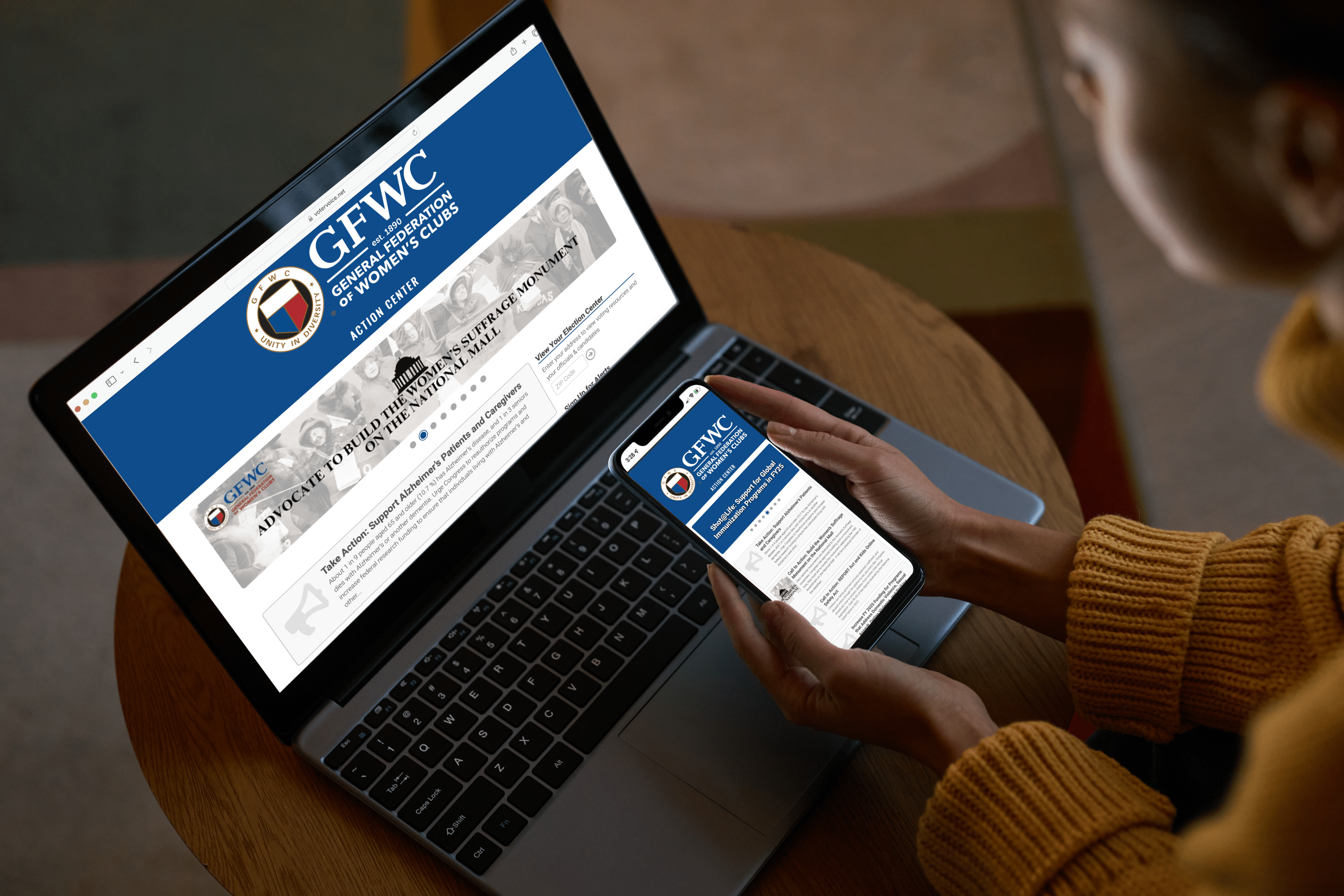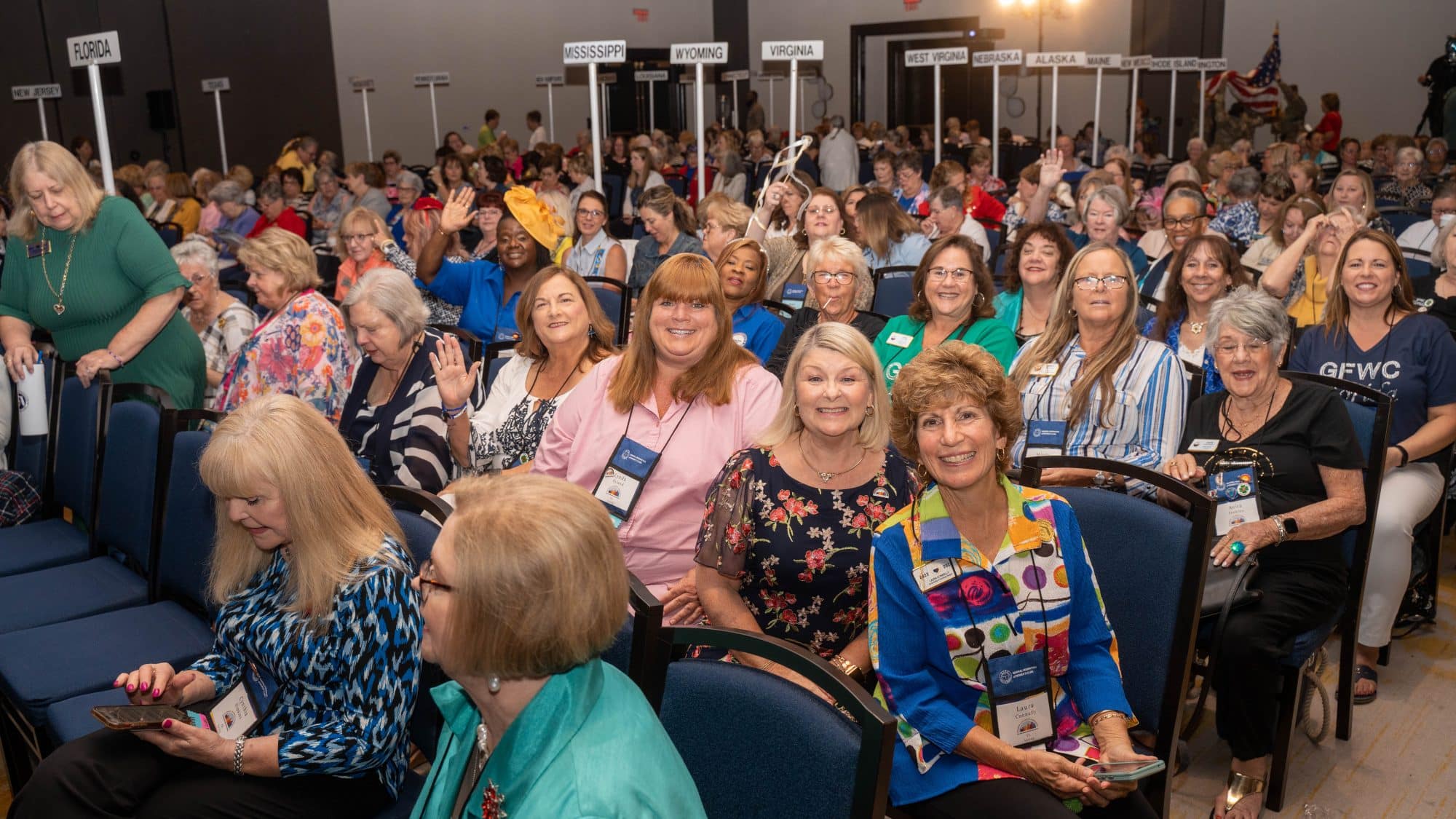Overview
GFWC Legislative Priorities are guided by our GFWC Resolutions which are voted on by delegates from State Federations each year at our Annual Convention. These decisions guide our volunteer programs and advocacy goals for the upcoming year and beyond. To download a copy of the “GFWC 2025 Federal Legislative Priorities,” for the 119th Congress, 2025-2026, click here.
Our Guiding Documents
GFWC 2025 Federal Legislative Priorities
VAWA Appropriations: GFWC urges Congress to provide increased federal funding for FY 2025 and FY 2026 to provide safety, access to services, and justice for survivors of domestic violence, dating violence, sexual assault, and stalking. Survivors rely on federally funded direct services such as shelter, rape crisis response, legal assistance, and counseling. Communities rely on prevention programs, available 24-hour hotlines, and trauma-informed training for law enforcement.
Anti-trafficking: GFWC urges Congress to pass anti-trafficking and anti-exploitation bills reauthorizing essential programs to support survivors and combat human trafficking in all forms, both domestically and internationally. Proposed legislation, the Trafficking Survivors Relief Act, would provide federal criminal relief to survivors of human trafficking who committed a non-violent offense as a direct result of having been a victim of trafficking. GFWC supports efforts to strengthen collaboration between federal, state, and local law enforcement, and improve resources available to survivors.
Victims of Crime Act: GFWC supports robust funding for the Crime Victims Fund authorized by the Victims of Crime Act (VOCA). The Fund is financed by criminal fines and penalties from convictions in federal court, not taxpayer dollars. The Office of Victims of Crime disburses money from this fund to states and other entities to support victim compensation and assistance programs, including domestic violence shelters, rape crisis centers, child advocacy centers, and other child sexual abuse treatment programs. Proposed bipartisan legislation, the Crime Victims Fund Stabilization Act, would redirect unobligated resources collected through the False Claim Act to the Crime Victims Fund for five years, while maintaining critical protection and compensation for whistleblowers.
Online Safety: GFWC supports efforts to prevent online sexual exploitation of children. Proposed legislation includes the TAKE IT DOWN Act which will criminalize the publication of nonconsensual intimate imagery, including AI-generated deepfakes, require social media and other websites to remove such images within 48 hours of receiving notice from the victim, and ensure that perpetrators are held accountable. The SHIELD Act would provide federal law enforcement with the tools they need to crack down on privacy violations, provide victims with legal protections, and hold exploiters accountable. Additional bills are expected.
GFWC supports increased funding for the National Endowment for the Arts to enhance state and local programs that help transform communities into beautiful and resilient places through strategies that incorporate arts and culture.
GFWC urges Congress to reauthorize the Older Americans Act and the Farm Bill, protecting funding and strengthening programs addressing hunger and food insecurity.
GFWC supports federal funding for STEAM (science, technology, engineering, arts, and math) programs; strong educational programs with challenging academic curricula for all students including those with learning, social, mental, and physical disabilities; and increased funding for the Institute of Museum and Library Services to strengthen local community resources.
GFWC encourages balance between the interests of proper management of resources, adequate water supplies, protection of wildlife, and the interests of energy production, including more fuel-efficient and renewable energy sources.
Global Vaccinations: GFWC supports funding the CDC’s polio eradication and measles elimination programs through the Health and Human Services appropriations bill, and funding through the State Department/Foreign Operations appropriations bill for immunizations and improving global disease detection systems that enable other nations to effectively detect and efficiently respond to a range of other diseases. Preventing diseases at their source is the most cost-effective approach, saves the most lives, and makes the world more resilient to new viruses that could cause the next pandemic. Without coordination and rapid analysis of national and international public health data, private sector pharmaceutical manufacturers would not have the lead time required to roll out updated vaccines at scale and prevent deaths. The United States must remain the global leader in medical research and innovation.
Breast Cancer Screenings: GFWC urges Congress to require all health insurance plans to cover screenings, supplemental screenings, and diagnostic examinations at no cost to patients who are at greater risk for breast cancer. Beginning September 2024, the Food and Drug Administration (FDA) requires radiology services to inform patients whether they have dense breasts.
Contacts:
Suellen B. Brazil
GFWC International President
sbrazil@gfwc.org, T: 202-347-3168
Debra Bryant
GFWC Federal Government Relations Consultant
debra.bryant@unified-solutions.us, T: 202-263-9902.
Legislative Success
Thanks to the support of 60,000+ GFWC advocates, legislation has been passed to actively improve the lives of others.
Advocacy in Action

The Legislative Action Center
In accordance with the resolutions adopted by the General Federation of Women’s Clubs, GFWC often joins other national organizations to urge congressional or federal agency action on a particular matter. These letters, in addition to individual clubwomen contacting their members of Congress directly through the Legislative Action Center, result in a national network of grassroots advocates working together to improve the lives of club members, their communities, our nation, and the global community.
OUR IMPACT
GFWC members vary in age, talents, location, background, and profession, but are united in their dedication to actively improve the lives of others.
60,000+
members in affiliated clubs in every state
2,600
existing volunteer clubs across the globe
130+
founded in 1890, GFWC has over a century of history
Legislation/Public Policy Quarterly Newsletter
Stay up to date on important issues that impact GFWC’s advocacy efforts with the Legislation/Public Policy Quarterly Newsletter. These newsletters cover a range of topics, setting a goal of keeping our clubs and members educated and active on current issues impacting our nation.
2024-2026 Newsletters
- February 2025: How to Be an Effective Advocate
- April 2025: Grassroots Advocates
